- There are no more items in your cart
- Shipping Calculated at checkout
-
Sub-Total (inc. VAT)
£0.00
PPG SigmaGuard CSF 650 (also known as Amercoat CSF 650), is a two-component, solvent-free, amine-cured epoxy tank coating for crude oil/ballast and aliphatic petroleum products, with one-coat protection for steel structures, ships and storage tanks with excellent corrosion resistance.
- Also suitable as a coating system for the storage and transportation of drinking water
- Good resistance to various chemicals - Excellent resistance to crude oil up to 60°C (140°F)
- Can be applied by heavy-duty, single-feed, airless spray equipment (60:1)
- Reduced explosion risk and fire hazard - Good visibility due to light colour
- Can be reinforced with chopped glass fibre or matt
- Meets the requirements of EI 1541 (coating systems for aviation fuel storage tanks and pipes)
PPG SigmaGuard CSF 650 (also known as Amercoat CSF 650), is a two-component, solvent-free, amine-cured epoxy tank coating for crude oil/ballast and aliphatic petroleum products with one-coat protection for steel structures, ships and storage tanks with excellent corrosion resistance. Excellent resistance to crude oil up to 60°C (140°F), the coating meets the requirements of EI 1541 (coating systems for aviation fuel storage tanks and pipes).
SigmaGuard CSF 650 is also suitable as a coating system for the storage and transportation of drinking water.
Features & Benefits
- Tank coating for crude oil/ballast and aliphatic petroleum products
- Also suitable as a coating system for the storage and transportation of drinking water
- Good resistance to various chemicals
- One-coat protection for steel structures, ships and storage tanks with excellent corrosion resistance
- Can be applied by heavy-duty, single-feed, airless spray equipment (60:1)
- Reduced explosion risk and fire hazard
- Good visibility due to light colour
- Can be reinforced with chopped glass fibre or mat
- A clear version is available for application of glass mats repair systems or application of chopped glass fibres
- Contact our customer services (0113 2455450) for more information
- Meets the requirements of EI 1541 (coating systems for aviation fuel storage tanks and pipes)
- Excellent resistance to crude oil up to 60°C (140°F)
| Reference | Colour | Size | Gloss Level |
|---|---|---|---|
| 179130 | Green | 4 litres | Gloss |
| 179131 | Green | 20 litres | Gloss |
| - | Off-White | 20 litres | Gloss |
More colours may be available, depending on order quantity; contact our sales team on 0113 2455450 or [email protected] to discuss your requirements.
Product Data
Two-component, solvent-free, amine-cured epoxy coating
| Data for mixed product at 20°C (68°F) | |
|---|---|
| Number of components | Two |
| Mass density | 1.3 kg/l (10.8 lb/US gal) |
| Volume solids | 100% |
| VOC (Supplied) | Directive 1999/13/EC, SED: max. 109.0 g/kg |
| max. 143.0 g/l (approx. 1.2 lb/US gal) | |
| EPA Method 24: 120.0 g/ltr (1.0 lb/USgal) | |
| Recommended dry film thickness | 300 - 600 µm (12.0 - 24.0 mils) depending on system |
| Theoretical spreading rate | 3.3 m²/l for 300 µm (134 ft²/US gal for 12.0 mils) |
| Pot life | 1 hour at 20°C (68°F) |
| Dry to touch | 8 hours |
| Overcoating Interval | Minimum: 24 hours |
| Maximum: 20 days | |
| Full cure after | 5 days |
| Shelf life | Base: at least 24 months when stored cool and dry |
| Hardener: at least 24 months when stored cool and dry | |
Notes:
- Refer below for more details on spreading rate and film thickness, overcoating intervals and curing times
Surface Preparation
Recommended Substrate Conditions and Temperatures
Substrate conditions
- Steel; blast cleaned to ISO-Sa2½, blasting profile 50 – 100 µm (2.0 – 4.0 mils)
- Suitable primer; SIGMAGUARD 260, SIGMACOVER 280, SIGMAPRIME series or SIGMACOVER 522, depending on system requirements
- Steel; power tooling to ISO-St3 for small and isolated areas (like repairs and joint welds) in fresh water and potable water tanks where spot blasting might be impractical
Substrate Temperature & Application Conditions
- Substrate temperature during application should be above 5°C (41°F)
- Substrate temperature during application should be at least 3°C (5°F) above dew point
System Specification
- SIGMAGUARD CSF 650: 1 x 300 µm (12.0 mils); or a suitable primer of 50 µm (2.0 mils) + SIGMAGUARD CSF 650: 1 x 250 µm (10.0 mils)
Application
Instructions for Use
Mixing ratio by volume: base to hardener 80:20 (4:1)
- At lower temperature, the viscosity will be too high for spray application
- The temperature of the mixed base and hardener should preferably be at least 20°C (68°F)
- No thinner should be added
- For recommended application instructions, see working procedure
Induction Time
- None.
Airless spray
- Use heavy-duty, single-feed, airless spray equipment, preferably 60:1 pump ratio and suitable high-pressure hoses
- In-line heating or insulated hoses may be necessary to avoid cooling down of paint in hoses at low air temperature
- Application with 45:1 airless spray equipment is possible, provided in-line, heated high-pressure hoses are used
- Length of hoses should be as short as possible
Recommended thinner
- No thinner should be added
Nozzle orifice
- Approx. 0.64 mm (0.025 in)
Nozzle pressure
At 20°C (68°F) paint temperature min. 28.0 MPa (approx. 280 bar; 4061 p.s.i.). At 30°C (86°F) min. 22.0 MPa (approx. 220 bar; 3191 p.s.i.)
Note:
In case of using 45:1 airless spray equipment, the paint must be heated to approximately 30°C (86°F) in order to obtain the right application viscosity
Brush/roller
Recommended thinner
- For stripe coating and spot repair only, no thinner should be added
Cleaning Solvent
- THINNER 90-83 (preferred) or 90-53.
Note:
All application equipment must be cleaned immediately after use. Paint inside the spraying equipment must be removed before the pot life has been expired.
Spreading Rate and Film Thickness
| DFT | Theoretical spreading rate |
|---|---|
| 250 µm (10.0 mils) | 4.0 m²/l (160 ft²/US gal) |
| 300 µm (12.0 mils) | 3.3 m²/l (134 ft²/US gal) |
| 600 µm (24.0 mils) | 1.7 m²/l (67 ft²/US gal) |
Note:
- Maximum DFT when brushing: 200 µm (8.0 mils)
Measuring wet film thickness
- A difference is often obtained between the measured apparent WFT and the real applied WFT. This is due to the thixotropy and the surface tension of the paint, which retards the release of air, trapped in the paint film for some time
- A practical recommendation is to apply a WFT, which is equal to the specified DFT plus 60 µm (2.4 mils)
Measuring dry film thickness
- Because of low initial hardness the DFT cannot be measured within some days, due to the penetration of the measuring device into the soft paint film
- The DFT should be measured using a calibration foil of known thickness placed in between the coating and the measuring device
Overcoating interval for DFT up to 300 µm (12.0 mils)
| Overcoating with... | Interval | 5°C (41°F) | 10°C (50°F) | 20°C (68°F) | 30°C (86°F) | 40°C (104°F) |
|---|---|---|---|---|---|---|
| Itself | Minimum | 3.5 days | 36 hours | 24 hours | 16 hours | 12 hours |
| Maximum | 20 days | 20 days | 20 days | 14 days | 7 days |
Notes:
- Surface should be dry and free from any contamination
Curing time for DFT up to 300 µm (12.0 mils)
| Substrate temperature | Dry to handle | Full cure |
|---|---|---|
| 5°C (41°F) | 60 hours | 15 days |
| 10°C (50°F) | 30 hours | 7 days |
| 20°C (68°F) | 16 hours | 5 days |
| 30°C (86°F) | 10 hours | 3 days |
| 40°C (104°F) | 8 hours | 48 hours |
Notes:
- Adequate ventilation must be maintained during application and curing (please refer to information sheets information sheet 1433 and Directives for Ventilation Practice (information sheet 1434)
- For drinking water tanks, a tank wash should be carried out after full cure and before the tank goes into service
- When used as coating system for storage and transport of drinking water the recommended working and washing procedure should be followed:
Washing procedures
- The recommended washing procedure must be applied after completion of the application.
- Sufficient time for full-curing and ventilation must be allowed in accordance with the recommendations as stated in the latest Product Data Sheets and working procedure.
- Always an adequate washing procedure should be followed.
- Several adequate washing procedures are available and may be used (see e.g. washing procedure described in relevant certificate).
Example 1: Adequate washing procedure
- After full curing of the system as per the latest PDS, the tank should be filled completely with fresh tap water
- The fresh tap water should remain in the tanks at least 4 full days
- Afterwards all tank compartments such as inner hull sides, bottom and deck-heads etc. should be thoroughly washed using high pressure water
- After washing, the tanks should be thoroughly drained
- After this procedure the tanks will be fit to carry drinking water
Example 2: Adequate washing procedure
- All personnel should wear watertight suits, boots and gloves properly cleaned with a sodium hypochlorite solution (1% active chlorine per litre)
- All tank sides, bottom and deckheads etc. should be brush cleaned or high-pressure spray cleaned with 1% active chlorine solution as above|note: this can also be done by butterworth washing
- All parts should be high pressure cleaned with tap water and tanks drained
- Concentrated active chlorine solution should be sprinkled on bottom; approx. 1 litre per 10 m² (1 quart per 100 ft²)
- Tanks should be filled with tap water to a depth of approx. 20 cm (8 inches) and the water should remain in the tank for at least 2 hours (max. 24 hours)
- Tanks should be thoroughly flushed out with tap water
- Depending upon local regulations it may be necessary to take water samples, after filling tank completely, to check on bacteria
- After this procedure the tanks will be fit to carry drinking water
Pot Life (at application viscosity)
| Mixed product temperature | Pot life |
|---|---|
| 20°C (68°F) | 1 hour |
| 30°C (86°F) | 45 minutes |
| 40°C (104°F) | 25 minutes |
Note:
- Due to exothermic reaction, temperature during and after mixing may increase
Disclaimer
- SIGMAGUARD CSF 650 is approved for purpose in accordance with the requirements of the relevant certificate
- Rawlins Paints & PPG Protective & Marine Coatings does not accept any responsibility or liability for any odour, taste or contamination imparted to the drinking water from the coatings or products retained in the coating
Safety Precautions
- For paint and recommended thinners, see information sheets information sheet 1430, information sheet 1431 and the relevant Material Safety Data Sheets in the attachments section above
- Although this is a solvent-free paint, care should be taken to avoid inhalation of spray mist, as well as contact between the wet paint and exposed skin or eyes
- If workers are exposed to concentrations above the exposure limit, they must use appropriate personal protective equipment (PPE)
- Ventilation should be provided in confined spaces to maintain good visibility
References
- Conversion Tables (information sheet 1410)
- Explanation to product data sheets (information sheet 1411)
- Safety Indicators (information sheet 1430)
- Safety in Confined Space and Health Safety, Explosion Hazard - Toxic Hazard (information sheet 1431)
- Safe Working in Confined Spaces (information sheet 1433)
- Directives for Ventilation Practice (information sheet 1434)
- Cleaning of Steel and Removal of Rust (information sheet 1490)
- Specification for Mineral Abrasives (information sheet 1491)
- Relative humidity - Substrate Temperature - Air Temperature (information sheet 1650)
Data sheet
- Manufacturer
- PPG
- For Use On
- Steel
- Application Method
- Brush, Roller, Spray
- Sheen
- Gloss
- Colour
- Standard / Ready Mixed
- VOC Levels
- Low (50-149 g/l)
- Single, Two or Three Pack
- Two-Pack
- Product Certifications
- Meets the requirements of EI 1541 2.2 (coating systems for aviation fuel storage tanks and pipes)
- Pack Size
- 4L, 20L
- Parts
- Two
- Base Type
- Solvent-borne
- Solvent
- Epoxy
- Mixing Ratio
- 4:1
- Suitable Substrates
- Steel
- Key Features
- For crude oil/ballast and aliphatic petroleum products, with one-coat protection for steel structures, ships and storage tanks with excellent corrosion resistance.
- Touch Dry (at 20°C)
- 8 hours
- Dry to Handle (at 20°C)
- 16 hours
- Dry to Recoat (at 20°C)
- 24 hours
- Fully Cured (at 20°C)
- 5 days
- Pot Life (at 20°C)
- 1 hour
- Coverage
- 3.3 m²/l for 300 µm (134 ft²/US gal for 12.0 mils)
- Recommended Thinner/Cleaner
- 90-83 or 90-53
- Unit Contents
- Base & hardener
- Compatible Primers
- SIGMAGUARD 260, SIGMACOVER 280, SIGMAPRIME series or SIGMACOVER 522, depending on system requirements
- Compatible Topcoats
- -
- Max. Application Temperature
- -
- Min. Application Temperature
- 5°C (41°F)
- Density
- 1.3 kg/l (10.8 lb/US gal)
- Solids by Volume
- 100%
- VOC
- Directive 1999/13/EC, SED: max. 109.0 g/kg max. 143.0 g/l; EPA Method 24: 120.0 g/ltr
- Shelf Life (from date of manufacture)
- Base & hardener: at least 24 months
- UN Number (Activator)
- UN3470
- UN Number (Base)
- UN3082
- Base Type
- Solvent Free
- Suitable For Use On
- Steel
- Finish
- Gloss
- Application Method
- Brush
- Application Method
- Roller
- Application Method
- Spray
- Product Usage Type
- Tank Coating
- Product Range
- SigmaGuard
- Colour Family
- Green
Questions
Question about the product
Be the first to ask a question about this product!
IMPORTANT SHIPPING & DELIVERY INFORMATION
PPG SigmaGuard CSF 650 is only available with the shipping and delivery timescales listed below - please do not contact our Customer Support Team with enquiries about alternative or earlier shipping and delivery times.
Saturdays and Sundays, as well as Bank Holidays, are not classed as working days.
Orders placed after the cut-off for this product will not be processed for earliest dispatch until 9am the next working day.
All delivery costs below are excluding VAT
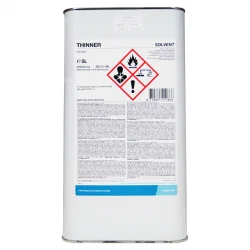
PPG Thinner 90-53
This thinner has been developed by PPG Protective and Marine Coatings for use with selected paint products.
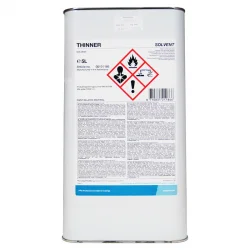
PPG Thinner 90-83
This thinner has been developed by PPG Protective and Marine Coatings for use with selected paint products.
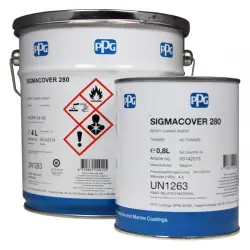
PPG SigmaCover 280
Universal epoxy anticorrosive primer suitable for ballast tanks, decks, topside, superstructure, hull and cargo oil tanks. Used in protective coating systems for steel and non-ferrous metals, curing at temperatures down to 5°C, and can be overcoated with most alkyd, chlorinated rubber, vinyl, epoxy and two-component polyurethane coatings....
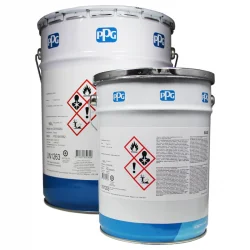
PPG SigmaCover 522
PPG SigmaCover 522 is a two-component, micaceous iron oxide-pigmented, polyamide-cured epoxy primer/sealer/coating. It has excellent adhesion to, and sealing of, weathered, cleaned, zinc-rich primers and metal-sprayed steel, with good adhesion to properly pre-treated galvanized steel. Can be used in systems for atmospheric or water-immersed...
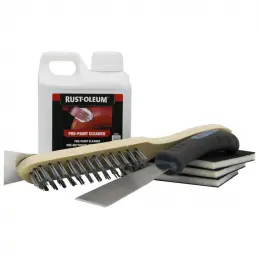
Surface Preparation Kits for Steel
These surface preparation kits for steel have been created to help provide customers with an easily accessible bundle of tools to aid in the preparation of steel surfaces in accordance with ISO 8501-1 (St2/3) and SSPC (SP 2/3). Please click here for important information about these kits. Kit Contents: SET 1 (Hand Tools) 1 x Rust-Oleum...



